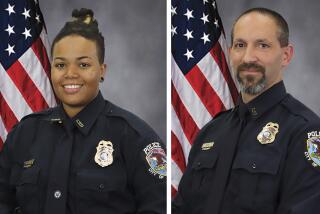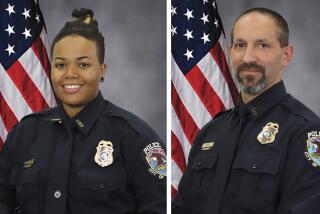Radke Sentenced to 25 Years to Life
- Share via
Ending but still not resolving a puzzling case, a San Diego Superior Court judge sentenced Mark Alan Radke on Monday to the maximum term possible--25 years to life in prison--for the brutal 1988 killing of Mira Mesa teen-ager Jeffrey Rudiger.
Judge J. Richard Haden said that nothing less than the maximum would do for Radke, convicted in August of first-degree murder in the death of Rudiger, because of the “unspeakable brutality of the crime.” Radke--who was married Saturday--will be eligible for parole in 17 years.
Rudiger, a junior at Mira Mesa High School, disappeared after work on the night of Jan. 21, 1988. His beaten body was found the next day in a Scripps Ranch alley.
But Haden, as well as the lawyers in the case, said that even the harsh term did not fully close the case because it still is not known whether Radke--or a mystery accomplice--wielded the murder weapon.
The judge said he was firmly convinced Radke was guilty of murder. But he said, “No one except Mr. Radke knows what happened that night.”
Radke, however, did not speak a word at the sentencing hearing. He did not testify in his behalf at the trial. And he did not talk about the crime when he was interviewed by probation officers recommending sentencing options to Haden, defense lawyer Douglas C. Brown said.
If Radke had spoken Monday before Haden, his comments would have been “more academic than practical,” Brown said.
Brown said later Monday that he already had filed an appeal and was hopeful “more facts will come out that will prove (Radke) was not the killer.”
Jeffrey Rudiger’s sister, Kelly, 23, who has served as a spokeswoman for the Rudiger family and who has become an ardent advocate for victims’ rights, said after the sentencing that she “felt a little bit of relief.”
Saying that she wanted Haden to “share the true meaning and feeling of victimization,” Kelly Rudiger had urged the judge to impose the maximum term. She told him at the hearing that his decision “will never bring Jeffrey back to us, but a full life term sentence to the individual who stole Jeffrey from us will at least restore our faith in the law.”
Radke’s mother, Virginia Radke, said she remains convinced that her son is innocent. His father, Elmer Radke, said prosecutors had “conned the jury into thinking there were two or more people. Why aren’t they out looking for the other people?”
A jury convicted Radke on Aug. 14 of first-degree murder. But it could not decide a second count that alleged Radke used a deadly weapon in the killing.
Deputy Dist. Atty. Daniel G. Lamborn has said the jury’s indecision meant at least some jurors believed a second person may have hit Rudiger repeatedly with the weapon.
Juror Ray Sievers, 51, of Poway, attended the sentencing hearing and said the jury deadlocked, 10-2 for conviction, on the second count. “I don’t know if any of us were sure there was more than one person,” Sievers said. “But (Radke) was definitely one.”
Lamborn said Monday that if police had “some leads as to some second person, we’d pursue it. Our only hope is that some day (Radke) will come forward with information.”
Although the beginning of the case was delayed for months with legal maneuvering over whether most of the evidence was legally obtained, prosecutors first mentioned the possibility of an accomplice when the trial began last July.
Rudiger was found dressed only in underwear and a T-shirt. He was wearing handcuffs, had been bludgeoned on the head with a blunt object and had cuts on his body.
Brown said at the trial that it appeared Rudiger was hit 26 times with a tire iron or similar object.
Radke, now 24, was arrested after Rudiger’s friends told police that he and Radke were working together on a secret project. Radke and Rudiger had worked together at a Chuck E. Cheese restaurant in Scripps Ranch, near where Rudiger’s body was found.
Before the case made it to trial, it generated three separate appeals over whether police had acted properly in detaining Radke for questioning after a traffic stop.
At one point, a state appellate court ruled that police were overzealous and had violated Radke’s constitutional rights by placing him in handcuffs and drawing a revolver. That decision appeared to make virtually all evidence in the case off-limits to prosecutors.
But in September, 1989, San Diego Superior Court Judge Charles Hayes ruled that officers had probable cause--or a “strong suspicion”--to arrest Radke before they ever saw him. A state appellate court upheld that ruling in January, meaning all the evidence that officers later found was obtained legally.
Blood spots that matched Rudiger’s blood type were found in Radke’s car trunk, in the wheel wells of his recently cleaned car and on his jacket, Lamborn said at the trial.
Lamborn also said blood spattering indicated one person held Rudiger’s legs while another held his head. He said that Rudiger’s body had been dragged twice--once a distance of 70 to 80 feet--by two people.
But the prosecutor also said a motive remained uncertain.
According to testimony at the trial, Rudiger told friends that he had received wine coolers for taking part in the first part of the purported project. But in an interview with police that was taped and played at the trial, Radke said he knew nothing about a “project” or “mission.”
After the sentencing hearing concluded, Brown disclosed that Radke had married Lee Wilson, a longtime family friend, on Saturday. “I guess they’re just in love and that was the time they could do it, while he was still here,” Brown said.
More to Read
Sign up for Essential California
The most important California stories and recommendations in your inbox every morning.
You may occasionally receive promotional content from the Los Angeles Times.




![Vista, California-Apri 2, 2025-Hours after undergoing dental surgery a 9-year-old girl was found unresponsive in her home, officials are investigating what caused her death. On March 18, Silvanna Moreno was placed under anesthesia for a dental surgery at Dreamtime Dentistry, a dental facility that "strive[s] to be the premier office for sedation dentistry in Vitsa, CA. (Google Maps)](https://ca-times.brightspotcdn.com/dims4/default/07a58b2/2147483647/strip/true/crop/2016x1344+29+0/resize/840x560!/quality/75/?url=https%3A%2F%2Fcalifornia-times-brightspot.s3.amazonaws.com%2F78%2Ffd%2F9bbf9b62489fa209f9c67df2e472%2Fla-me-dreamtime-dentist-01.jpg)








